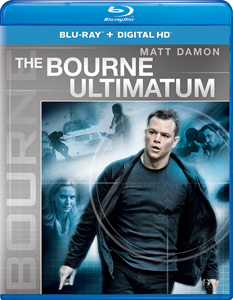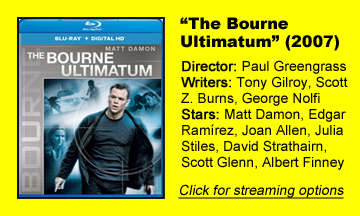From Jan. 6-14, we’re looking back at the five films of the “Bourne” series, so prepare to have your memory refreshed. Next up is the third film, “The Bourne Ultimatum” (2007):
Moving Bourne forward
“The Bourne Ultimatum” has everything we’ve come to expect from this century’s gritty action movies while also moving Jason Bourne’s (Matt Damon) characterization forward after it stalled in “The Bourne Supremacy” (2004).
Director Paul Greengrass and his team perhaps learn from the almost incomprehensibly edited sequences – notably the car chase – from that second film and slow down enough to make this trilogy capper more accessible, but still tense and smart.
Granted, if you understand everything that happens in “Ultimatum” – written by Tony Gilroy, Scott Z. Burns and George Nolfi from Robert Ludlum’s 1990 novel — you’re really good at the art of watching movies. But the broad strokes are accessible to all, in part because this entry has a point of view, digging into the question of extra-Constitutional powers.
Precursor to the kill list
A few years before Obama’s kill list became mainstream news, top CIA man Noah Vosen (David Strathairn) asserts to office rival Pamela Landy (Joan Allen, again a second lead of sorts with Damon) that he has the legal right to kill a U.S. citizen if he deems it necessary.
As we’ve also seen in some recent “Mission: Impossible” and James Bond films, the entire conflict of “Ultimatum” operates within the agency; it spawns its own threat, but it’s an open question whether that threat is to “American lives” or simply to the agency’s existence.
Amnesiac assassin Bourne – who (continuing from part two) is gradually getting his memories back and questioning the morality of his job — is a threat to Vosen’s secret agency Treadstone (now being resurrected under the name Blackbriar), so Vosen must take him out.
More urgency
“Supremacy” gives us a lot of quick flashes of Bourne’s assassin life without much payoff, but “Ultimatum” has more urgency as the end of a trilogy. (There will be two more “Bourne” films after this, and there are plenty more novels. But this is the capper to Bourne’s emotional arc about confronting his past.)
If Strathairn and Scott Glenn (“Daredevil”) aren’t enough unique-voiced agency officials for you, Albert Finney adds gravitas to the climax as Dr. Albert Hirsch, who inducted Bourne into this program.
The program itself remains sketchily defined. Did Bourne – real name David Webb — give up his memories in order to get his pesky conscience out of the way so he could kill people without hesitation? However, the thematic point is well taken, especially in the closing chase when Bourne asks a young agent with a gun on him if he knows why he’s been ordered to kill him.
While there is logic behind the idea of having soldiers who follow orders without question (especially in the field, when quick action is needed), that approach also leads to the potential for corruption. Combined with extra-Constitutional agencies (and isn’t that a contradiction? How can an illegal agency be legal?), soldiers can essentially become brainless tools.

That’s what Bourne is, and I think the memory loss is a story device for the audience to like him more and to crisply illustrate his internal struggle over the course of three films. There’s little question that these first three films have been pre-planned: For one thing, Ludlum’s source material already exists; for another, Julia Stiles’ Nicky is in the first two films for the sake of this one.
Nicky makes her move
Given almost no dialog, Stiles plays former Treadstone tech agent Nicky like a firm believer in Mark Twain’s advice about keeping your mouth shut lest you be thought a fool. It’s somewhat effective, as I’ve unconsciously assumed Nicky sympathizes with Bourne, even though she doesn’t come over to his side till this movie.
I still wish Stiles had more to do, though. And a frustratingly unanswered question remains: What was Nicky’s prior relationship with Jason? Were they a couple? Or did she simply think he was a deeper person than the other grunts who signed up? Maybe this will be explored in a later film.
Or maybe I’m barking up the wrong tree. “The Bourne Ultimatum” remains an action-thriller above all else – and a well-crafted one. I almost want to buy John Powell’s score and play it in my car while running errands, to make my life seem exciting.
And I love rooftop chases in foreign cities that result in our hero running through people’s apartments. I’d love it if Jason Bourne or Ethan Hunt or James Bond came plowing through a window into my living room, but these people always seem annoyed. They should instead enjoy their front-row seat to great action.


